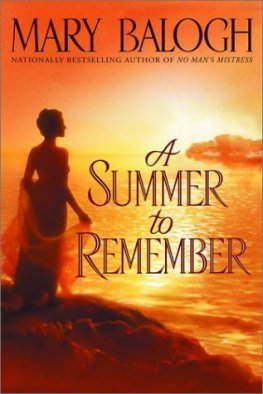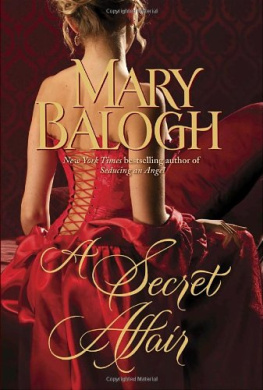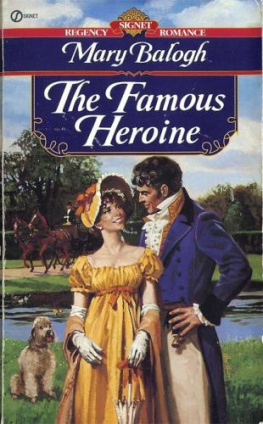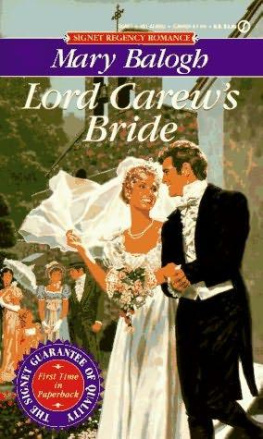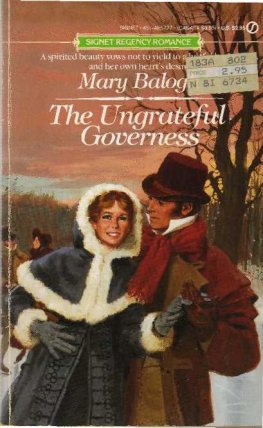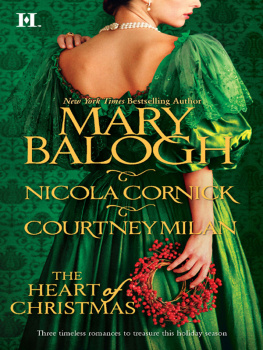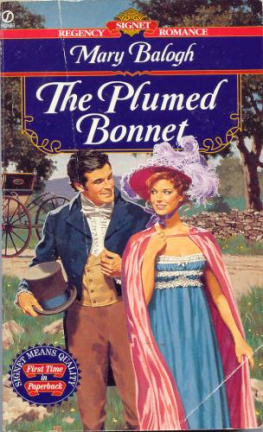Mary Balogh - Slightly Married
Here you can read online Mary Balogh - Slightly Married full text of the book (entire story) in english for free. Download pdf and epub, get meaning, cover and reviews about this ebook. year: 2003, publisher: Bantam Dell, genre: Prose. Description of the work, (preface) as well as reviews are available. Best literature library LitArk.com created for fans of good reading and offers a wide selection of genres:
Romance novel
Science fiction
Adventure
Detective
Science
History
Home and family
Prose
Art
Politics
Computer
Non-fiction
Religion
Business
Children
Humor
Choose a favorite category and find really read worthwhile books. Enjoy immersion in the world of imagination, feel the emotions of the characters or learn something new for yourself, make an fascinating discovery.

- Book:Slightly Married
- Author:
- Publisher:Bantam Dell
- Genre:
- Year:2003
- Rating:5 / 5
- Favourites:Add to favourites
- Your mark:
- 100
- 1
- 2
- 3
- 4
- 5
Slightly Married: summary, description and annotation
We offer to read an annotation, description, summary or preface (depends on what the author of the book "Slightly Married" wrote himself). If you haven't found the necessary information about the book — write in the comments, we will try to find it.
Slightly Married — read online for free the complete book (whole text) full work
Below is the text of the book, divided by pages. System saving the place of the last page read, allows you to conveniently read the book "Slightly Married" online for free, without having to search again every time where you left off. Put a bookmark, and you can go to the page where you finished reading at any time.
Font size:
Interval:
Bookmark:

SLIGHTLY
MARRIED

MARY
BALOGH
A DELL BOOK
Contents
P ROLOGUE

Toulouse, France April 10, 1814
T HE SCENE WAS ALL TOO FAMILIAR TO THE MAN surveying it. There was not a great deal of difference between one battlefield and another, he had discovered through long experiencenot, at least, when the battle was over.
The smoke of the heavy artillery and of the myriad muskets and rifles of two armies was beginning to clear sufficiently to reveal the victorious British and Allied troops establishing their newly won positions along the Calvinet Ridge to the east of the city and turning the big guns on Toulouse itself, into which the French forces under Soults command had recently retreated. But the acrid smell lingered and mingled with the odors of dust and mud and horse and blood. Despite an ever-present noisevoices bellowing out commands, horses whinnying, swords clanging, wheels rumblingthere was the usual impression of an unnatural, fuzzy-eared silence now that the thunderous pounding of the guns had ceased. The ground was carpeted with the dead and wounded.
It was a sight against which the sensibilities of Colonel Lord Aidan Bedwyn never became totally hardened. Tall and solidly built, dark-complexioned, hook-nosed, and granite-faced, the colonel was feared by many. But he always took the time after battle to roam the battlefield, gazing at the dead of his own battalion, offering comfort to the wounded wherever he could.
He gazed downward with dark, inscrutable eyes and grimly set lips at one particular bundle of scarlet, his hands clasped behind him, his great cavalry sword, uncleaned after battle, sheathed at his side.
An officer, he said, indicating the red sash with a curt nod. The man who wore it lay facedown on the ground, spread-eagled and twisted from his fall off his horse. Who is he?
His aide-de-camp stooped down and turned the dead officer over onto his back.
The dead man opened his eyes.
Captain Morris, Colonel Bedwyn said, you have taken a hit. Call for a stretcher, Rawlings. Without delay.
No, the captain said faintly. I am done for, sir.
His commanding officer did not argue the point. He made a slight staying gesture to his aide and continued to gaze down at the dying man, whose red coat was soaked with a deeper red. There could be no more than a few minutes of life remaining to him.
What may I do for you? the colonel asked. Bring you a drink of water?
A favor. A promise. Captain Morris closed parchment-pale eyelids over fading eyes, and for a moment the colonel thought he was already gone. He sank down onto one knee beside him, pushing his sword out of the way as he did so. But the eyelids fluttered and half lifted again. The debt, sir. I said I would never call it in. His voice was very faint now, his eyes unfocused.
But I swore I would repay it nonetheless. Colonel Bedwyn leaned over him, the better to hear. Tell me what I can do.
Captain Morris, then a lieutenant, had saved his life two years before at the Battle of Salamanca, when the colonels horse had been shot out from under him and he had been about to be cut down from behind while engaging a mounted opponent in a ferocious frontal fight. The lieutenant had killed the second assailant and had then dismounted and insisted that his superior officer take his horse. He had been severely wounded in the ensuing fight. But he had been awarded his captaincy as a result, a promotion he could not afford to purchase. He had insisted at the time that Colonel Bedwyn owed him nothing, that in a battle it was a soldiers duty to watch the backs of his comrades, particularly those of his superior officers. He was right, of course, but his colonel had never forgotten the obligation.
My sister, the captain said now, his eyes closed again. Take the news to her.
Ill do it in person, the colonel assured him. Ill inform her that your last thoughts were of her.
Dont let her mourn. The mans breath was being drawn in on slow, audible heaves. She has had too much of that. Tell her she must not wear black. My dying wish.
Ill tell her.
Promise me... The voice trailed away. But death had still not quite claimed him. Suddenly he opened his eyes wide, somehow found the strength to move one arm until he could touch the colonels hand with limp, deathly cold fingers, and spoke with an urgency that only imminent death could provoke.
Promise me you will protect her, he said. His fingers plucked feebly at the colonels hand. Promise me! No matter what!
I promise. The colonel bent his head closer in the hope that his eyes and his voice would penetrate the fog of death engulfing the agitated man. I give you my solemn vow.
The last breath sighed out of the captains lungs even as the words were being spoken. The colonel reached out a hand to close Morriss eyes and remained on one knee for a minute or two longer as if in prayer, though in reality he was considering the promise he had made Captain Morris. He had promised to take the news of her brothers death to Miss Morris in person though he did not even know who she was or where she lived. He had promised to inform her of Morriss dying wish that she not wear mourning for him.
And he had sworn on his most sacred honor to protect her. From whator from whomhe had no idea.
No matter what!
The echo of those last three words of the dying man rang in his ears. What could they possibly mean? What exactly had he sworn to?
No matter what!
C HAPTER I

England 1814
T HERE WAS A SHADY DELL SLICING THROUGH THE woods on the western side of the park at Ringwood Manor in Oxfordshire. The water of the brook gurgling over its rocky bed joined up eventually with a larger river that formed the boundary of the park and flowed through the nearby village of Heybridge. The dell was always secluded and lovely. However, on this particular morning in May it was breathtakingly beautiful. The bluebells, which did not usually bloom until June, had been seduced by a mild spring into making an early appearance. The azaleas were in flower too, so that the sloping banks were carpeted in blue and pink. Bright sunbeams slanted through the dark-leafed branches of tall cypress trees and dappled the ground with brightness and shadow while sparkling off the bubbling water of the brook.
Eve Morris was knee-deep in bluebells. She had decided that it was too glorious a morning to be spent in any of the usual activities about the house and farm or in the village. The bluebells were in bloom for such a short time, and picking them for the house had always been one of her favorite springtime activities. She was not alone. She had persuaded Thelma Rice, the governess, to cancel classes for a few hours and bring her two pupils and her infant son out flower picking. Even Aunt Mari had come despite her arthritic knees and frequent shortness of breath. Indeed, it had been her idea to turn the occasion into an impromptu picnic. She was sitting now on the sturdy chair Charlie had carried down for her, her knitting needles clicking steadily, a large basket of food and drink at her side.
Eve straightened up to stretch her back. A pile of long-stemmed flowers lay along the basket over her arm. With her free hand she pressed her ancient, floppy straw hat more firmly onto her head, even though the wide gray ribbon attached to its crown and brim was securely fastened beneath her chin. The ribbon matched her dress, a simply styled, high-waisted, short-sleeved cotton garment ideal for a morning in the country when no company was expected. She savored a conscious feeling of well-being. All of the summer stretched ahead, a summer unmarred by anxiety for the first time in many years. Well,
Font size:
Interval:
Bookmark:
Similar books «Slightly Married»
Look at similar books to Slightly Married. We have selected literature similar in name and meaning in the hope of providing readers with more options to find new, interesting, not yet read works.
Discussion, reviews of the book Slightly Married and just readers' own opinions. Leave your comments, write what you think about the work, its meaning or the main characters. Specify what exactly you liked and what you didn't like, and why you think so.

